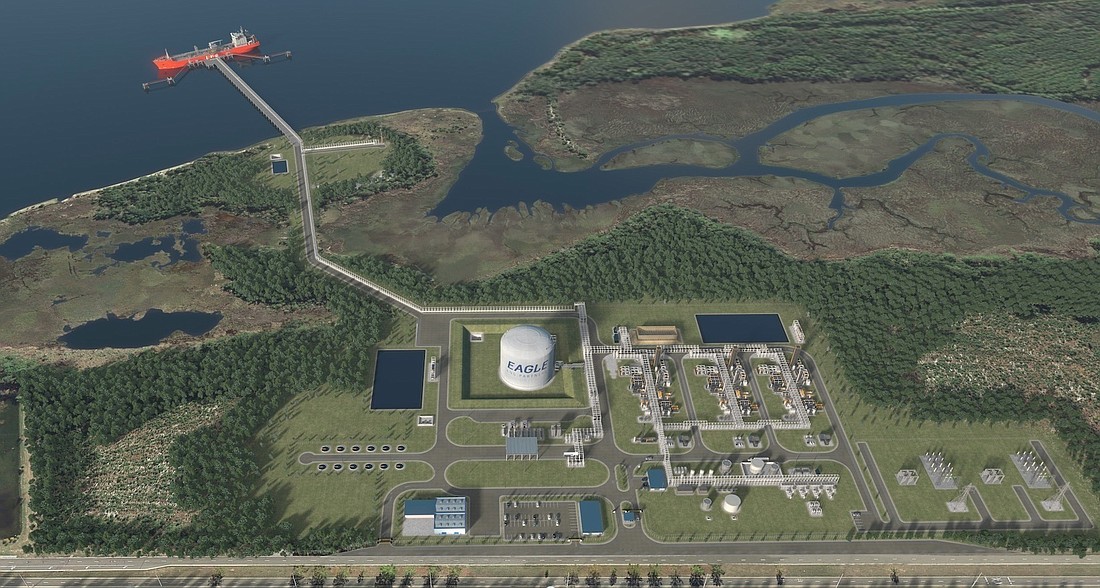
Houston-based Eagle LNG Partners LLC wants the city to give it another year to start construction on its estimated $542 million liquefied natural gas export facility in Northwest Jacksonville under a $23 million incentives deal.
An Eagle executive said April 22 that coronavirus-related border closures in some Caribbean and Central American countries over the last year and lingering quarantine orders kept the company from completing customer contracts with the government-owned and private utility companies that would receive the LNG shipping from Jacksonville.
“We did lose a year. There’s no question,” said Linda Berndt, Eagle LNG vice president of government and public relations.
“We asked for the year extension because of how slow some of these islands will be in recovery but we want to go sooner than a year.”
City Council is scheduled to take a final vote on the extension, Ordinance 2021-0241, at its May 25 meeting.
The bill would give Eagle until May 31, 2022, to begin building the facility on 200 acres at 1632 Zoo Parkway along the St. Johns River.
Eagle would have to complete the facility with 12 new, full-time jobs in place by Dec. 31, 2025, as part of the extension.
The jobs would have an average wage of $85,000 per year, according to the city Office of Economic Development.
The deadlines are tied to an up to $23 million Recapture Enhanced Value Grant at 50% of the incremental increase in ad valorem taxes, according to a legislative summary filed with the bill.
Before Council approved the original incentive deal in December 2019, city economic development officials said Eagle would invest $58 million in site facilities and install about $484 million in equipment.
The Council Finance Committee supported the request 6-0 on May 19.
“Anything we can do to expedite construction, we will do,” Berndt said.
As pandemic restrictions ease, Berndt said Eagle’s potential Caribbean and Central American customers are looking at inexpensive U.S. natural gas as a way to reduce costs and help bring tourism back.
“There were a lot of them that were in economic trouble because they’re in the tourism business and they didn’t really even want to talk to us during the early part of the pandemic,” Berndt said.
She said the Caribbean islands are looking at liquefied natural gas as a way to reduce energy costs to help rebound tourism.
“The conversations are starting to happen again and we’re able to travel to the islands. Most of our people are fully vaccinated, so it’s better,” she said.
Eagle’s investment outside the U.S. could be nearly double what it plans in Jacksonville.
Company President Sean Lalani said in November 2019 that Eagle is prepared to spend up to $1 billion for receiving infrastructure in unidentified Central American and Caribbean Island nations.
Berndt said in April that planned investment has not changed. Eagle intends to build liquefied natural gas receiving terminals for its customers that can accommodate ships that are “the right size” for the Caribbean island market that Eagle says larger suppliers will not.
“We absolutely will build permanent infrastructure on these islands,” she said.
According to company executives, Eagle’s North Jacksonville facility will us the smaller LNG carrier ships to target lower volume, relatively underserved markets that need less supply to operate than utilities in Asian, North American and European counties.
“Ultimately, it comes down to economics,” Berndt said.
“You have to be able to beat the current price of power wherever you’re displacing diesel, heavy fuel oil or whatever they’re buying today. You have to figure in ... the cost of shipping, fuel and what’s the best and most economical way to get us there.”
The company has a relationship with Crowley Maritime Corp.’s LNG group that ships liquefied natural gas from Eagle’s Northeast Florida facility in Maxville
Crowley ships the LNG to customers in Puerto Rico and the Caribbean.
Finance Committee Vice Chair Randy DeFoor said May 19 the project also is important for JaxPort because of the increasing number of cargo carriers that use LNG as a fuel source.
Mayor Lenny Curry’s administration and the economic development office requested that Council President Tommy Hazouri introduce the legislation to extend the deal.
“Obviously, Eagle continues to have a massive interest in a massive expansion here in town but like everybody has faced COVID delays,” city Chief Administrative Officer Brian Hughes said April 12.
“This would give them a little extra time.”